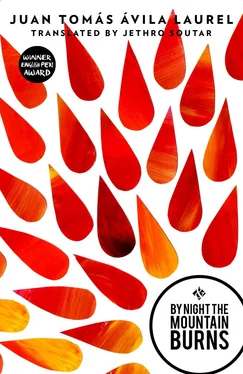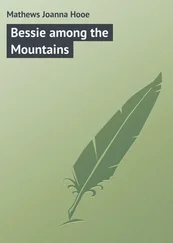Juan Ávila Laurel - By Night the Mountain Burns
Здесь есть возможность читать онлайн «Juan Ávila Laurel - By Night the Mountain Burns» весь текст электронной книги совершенно бесплатно (целиком полную версию без сокращений). В некоторых случаях можно слушать аудио, скачать через торрент в формате fb2 и присутствует краткое содержание. Год выпуска: 2014, Издательство: And Other Stories Publishing, Жанр: Современная проза, на английском языке. Описание произведения, (предисловие) а так же отзывы посетителей доступны на портале библиотеки ЛибКат.
- Название:By Night the Mountain Burns
- Автор:
- Издательство:And Other Stories Publishing
- Жанр:
- Год:2014
- ISBN:нет данных
- Рейтинг книги:5 / 5. Голосов: 1
-
Избранное:Добавить в избранное
- Отзывы:
-
Ваша оценка:
- 100
- 1
- 2
- 3
- 4
- 5
By Night the Mountain Burns: краткое содержание, описание и аннотация
Предлагаем к чтению аннотацию, описание, краткое содержание или предисловие (зависит от того, что написал сам автор книги «By Night the Mountain Burns»). Если вы не нашли необходимую информацию о книге — напишите в комментариях, мы постараемся отыскать её.
By Night the Mountain Burns — читать онлайн бесплатно полную книгу (весь текст) целиком
Ниже представлен текст книги, разбитый по страницам. Система сохранения места последней прочитанной страницы, позволяет с удобством читать онлайн бесплатно книгу «By Night the Mountain Burns», без необходимости каждый раз заново искать на чём Вы остановились. Поставьте закладку, и сможете в любой момент перейти на страницу, на которой закончили чтение.
Интервал:
Закладка:
As we children couldn’t expose ourselves to the air of the dead and had to be shut up at home whenever there was a funeral procession, we spent almost the entire month in the house. For there was a death every single day and it wasn’t unusual for one person to be buried in the morning and another to be buried in the afternoon. And every new coffin meant one less canoe in the island’s fishing fleet. Every day, a man or a woman’s corpse was taken out of that quarantine near the church with a sheet or length of cloth draped over it. It meant they would never be seen again, but nobody cried in there. Corpses were taken out discreetly, with their faces covered, as if they were being taken somewhere for treatment, so that the rest of the infirm didn’t lose hope. There was no conversation, everyone in there was silent, probably in agony. It wasn’t a hospital, it was a place you went to when you had the air of the dead in you.
A month went by and everyone still alive feared desperately for his or her life. Digestive matters became tremendously important. Everyone knew that the sickness began with a small stomach cramp and ended in a box made of floating wood under a mound of earth after some Latin from the Padre . Hearing that Latin was to experience something no one should have to experience. For after the priest’s Latin song-orations came the descent into the grave and the shovelling of earth, and everyone at the funeral, the deceased’s family and anyone able to come from the village, knew that was the moment you let out all the pain that had built up in your heart and said a final farewell to your loved one. Laments filled the air and the earth shook. Indeed you couldn’t witness it without shaking yourself. And this was the moment the women really opened their throats, which were connected to their hearts, the human centre of sadness, and released their tears of lament, which as I’ve already said, were more than mere tears of lament. They were something else. These laments had tears and words and might be mistaken for a song, but a song wailed with such feeling that it was truly heartrending to hear. And at the same time that the women wailed, they cried so much they drowned themselves in a sea of tears and mucus. Sometimes they even had to interrupt the lament to blow their noses, before carrying on. Someone should have put a stop to the whole practice, for everyone’s sake. Hearing people cry so deeply was a very striking thing, at least it was for me. Hearing it was devastating. Never in the history of the island had there been a sadder moment than the moment that immediately followed the Padre ’s Latin. It was a sadness that was supercharged, magnified to excess, to what might be called monumental levels. And the echoes of that monumental sadness were heard all the way home, all the way to the house of the deceased, where relatives gathered to offer their condolences. And the women thought they had to cry like that, and they thought it their duty to back up anyone else who cried like that. They thought it was a way of showing solidarity in grief.
The days of the ‘crown of thorns’ passed and our cemetery filled up. And he suffered ‘under the cross’, and they threw earth on someone else, and he had ‘ nails driven into him’, and they buried others still, until the situation had reached truly alarming proportions. Alarming proportions beyond what were already considered alarming proportions. As there was absolutely nothing to give the sick, people turned to their ways and customs, uncovering special formulas that might protect against the tremendous loss of life. You had to take such and such a thing, tie the image of a saint to your body, boil up the leaves of a particular plant, hang a blessed cloth over all the village taps. It was thought that the ministrants should do something. That the ministrants should carry the Maté Jachín around the village to drive away the shadow of evil that was hovering over the village and killing its children. Anything anyone thought of or dreamed up was tried out as a possible prevention or cure for the terrible disease. But one thing was tried more than anything else and that was the drinking of a decoction of leaves from the guava tree. Someone told someone that someone they knew had been told that someone they’d met had heard it said … until everyone in the big village knew that boiled guava leaves were the best cure for the evil that was threatening to wipe out the whole population of the island. This medicine was said to tanjer the belly — tanjer being a word in our language — meaning that it worked as a plug and stopped that never-ending torrent from pouring out of your body, a torrent that left you dry and drained you of life.
That month of the crown of thorns saw entire families buried, the last one to perish having to be buried by neighbours out of charity, for there were no kin left to perform the burial. Some parents lost all their children, children who were adults themselves. Some households had two coffins taken to the village graveyard at once, two loved ones dying on the same day. It wasn’t just horrible. It was horrendous. It scarcely needs saying how hard the men who dug the graves had to work. Scores of women died, scores of boys, scores of girls, and men who thought the disease couldn’t touch them paid for their ignorance with their lives. People who fished, people who planted on farms, men who were practised in the building of canoes, children who had learned to swim: all of them surrendered to the soil. ‘And he suffered, and he suffered under the weight of the cross. Then they put a crown of thorns on him and drove nails into him … ’ I don’t know what would have happened on the island if that loss of life had been accompanied by a different song, a happier song. Or, if it had not coincided with a time of year when the church required sorrowful singing that brought tears to your eyes. What I do know is that I think we should not have gone on singing that song, for everyone already felt abandoned, already felt they had no one to turn to. Think how our people must have felt being told that Cristo himself had ‘nails driven into him and then he descended into the abyss’. When we sang this, it wasn’t as if the abyss was something we didn’t know about or hadn’t seen. We thought the mournful song referred to us, to the countless brothers and sisters we’d buried with our own hands, to the graves dug by the few healthy men left on our island.
Many people died that month, and on our list of the departed we must include the doctor, who had no medicine to give himself. There was nothing in the hospital and he probably didn’t believe in the effectiveness of the decoction of guava tree leaves. Indeed it would have been hard for him to believe in the homemade remedy even if he’d wanted to, for, as the man who certified the dead, he’d seen too many souls rip out of bodies right before his eyes. And besides, he wasn’t trained to believe in things that weren’t written in books. So the doctor himself died, taken by the air of the dead of those who’d died before his eyes. Our people went to the shore and found a canoe that was no longer fit for paddling and built a coffin for the doctor. With his death, our island was left orphaned, for although he could offer no cure, he’d still been the first person we turned to whenever someone was touched by that evil. And we islanders didn’t view his death as just one more death, rather that his passing had left us to face the evil alone, an evil that was decimating the population. Our new solitude meant the evil could take an unexpected turn and no one on the island would know what was happening, no one would know what to do. Our island was all alone with that thing, a thing that had a name, yes, but a name that in no way suggested how lethal it was.
Читать дальшеИнтервал:
Закладка:
Похожие книги на «By Night the Mountain Burns»
Представляем Вашему вниманию похожие книги на «By Night the Mountain Burns» списком для выбора. Мы отобрали схожую по названию и смыслу литературу в надежде предоставить читателям больше вариантов отыскать новые, интересные, ещё непрочитанные произведения.
Обсуждение, отзывы о книге «By Night the Mountain Burns» и просто собственные мнения читателей. Оставьте ваши комментарии, напишите, что Вы думаете о произведении, его смысле или главных героях. Укажите что конкретно понравилось, а что нет, и почему Вы так считаете.












